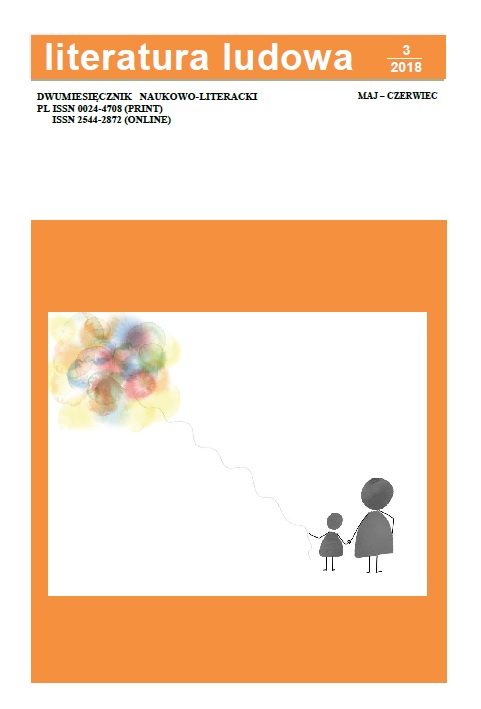The Betrayal of Childhood in a Socio-Cultural Context
DOI:
https://doi.org/10.12775/LL.3.2018.003Keywords
childhood, adulthood, symulakrum, pop culture, capitalismAbstract
In my article, I focus on the relationship between a child and adult in socio-cultural perspective in order to demonstrate how the representations of childhood are used by Polish authors of children’s literature in critical descriptions of war and other forms of violence. At first, I relate to the crucial moment in the European history in which there appeared a discourse of senility and youthfulness. Next, I present the main consequences of the “production” and “distribution” of images of childhood in pop culture. In the last part of my discussion, I analyse novels by Joanna Rudniańska, Jacek Dukaj, Grzegorz Gortat and Dorota Combrzyńska-Nogala, who, in their works about the Holocaust, the martial law in Poland and the war in Syria create the world in which young characters possess certain features belonging to the adult. My analyses demonstrate the sources of betrayal of childhood which appears in these novels like a sublime sign reflecting primarily adults’ fantasies about the child. As I show, this sign contains very few real issues referring to contemporary childhood.
References
ARIÉS, Ph. (1995). Historia dzieciństwa. Dziecko i rodzina w dawnych czasach (przeł. M. Ochab). Gdańsk: słowo/obraz terytoria.
BACZKO, B. (2009). Rousseau: samotność i wspólnota. Gdańsk: słowo/obraz terytoria.
BANDURA, L. (2004). Wpływ wojny na psychikę dzieci i młodzieży (fragment rozprawy doktorskiej z 1950 roku). Z. Kwieciński (wstęp i opracowanie). Toruń: Wydawnictwo Naukowe Uniwersytetu Mikołaja Kopernika.
BAUDRILLARD, J. (1994). Simulacra and simulations (trans. S. Glaser). Michigan: University of Michigan Press.
BOIS, J.-P. (1996). Historia starości. Od Montaigne’a do pierwszych emerytur (przeł. K. Marczewska). Warszawa: Oficyna Wydawnicza VOLUMEN.
COMBRZYŃSKA-NOGALA, D. (2012). Bezsenność Jutki. Łódź: Wydawnictwo Literatura.
CURTIUS, E. R. (1997). Literatura europejska i łacińskie średniowiecze (przeł. A. Borowski) Kraków: Universitas.
DUKAJ, J. (2009). Wroniec. Kraków: Wydawnictwo Literackie.
ERIKSON, E. H. (1977). Childhood and Society. London: Paladin Grafton Books. The Collins Publishing Group.
GIDDENS, A. (1991). The Transformation of Intimacy. Sexuality, Love, and Eroticism in Modern Societies. Stanford: Stanford University Press.
GITTINS, D. (1998). The Child in Question. Basingstoke: Macmillan.
GOODENOUGH, E. (2003). Introduction. In: E. Goodenough (ed.) Secret Spaces of Childhood. Michigan: The University of Michigan Press.
GORTAT, G. (2017). Moje cudowne dzieciństwo w Aleppo. Warszawa: Wydawnictwo Bajka.
HUNT, P. (2008). Children’s Literature and Childhood. Second edition. In: M. J. Kehily (ed.) An Introduction to Childhood Studies. Maidenhead: Open University Press.
JENKINS, H. (2011). John Fiske Reading the Popular with a new introductory essay on Why Fiske Still Matters. New York – London: Routledge.
KEHILY, M. J. (2008). Understanding the Childhood. An Introduction to Some Keys and Issues. In: M. J. Kehily (ed.) An Introduction to Childhood Studies. Second edition. Maidenhead: Open University Press.
LESZCZYŃSKI, G. (2012). Książki pierwsze. Książki ostatnie? Literatura dla dzieci i młodzieży wobec wyzwań nowoczesności. Warszawa: Wydawnictwo SBP.
LIVINGSTONE, S. (2002). Young People and New Media: Childhood and the Changing Media Environment. California: SAGE Publication Ltd.
NIKOLAJEVA, M. (2009). Theory, Post-Theory, And Aetonormative Theory. “Neohelicon”, XXXVI, 1, 13–24.
NOWACKI, D. (2009). Wroniec, Dukaj, Jacek. „Gazeta Wyborcza”. Pozyskano z http://wyborcza.pl/1,75410,7213988,Wroniec__Dukaj__Jacek.html.
POSTMAN, N. (1982). The disappearance of childhood. New York: Vintage Books.
RUDNIAŃSKA, J. (2012). XY. Warszawa: Wydawnictwo Muchomor.
ROUSSEAU, J. J. (2003). Wyznania (przeł. T. Boy-Żeleński). Kraków: Wydawnictwo Zielona Sowa.
STERCZEWSKI, P. (2010). Dukaj i krytycy robią stan wojenny. O „Wrońcu” i wokół „Wrońca”. „Polisemia – Polityczność literatury” (II – Literatura polska), 3.
WRÓBLEWSKI, M. (2017). Między baśnią a parabolą – małe formy Joanny Rudniańskiej. W: B. Olszewska, O. Pajączkowski (red.). Stare i nowe w literaturze dla dzieci i młodzieży – małe formy narracyjne (75-85).
Opole: Wydawnictwo Uniwersytetu Opolskiego.
Downloads
Published
How to Cite
Issue
Section
License
1. The authors give the publisher (Polish Ethnological Society) non-exclusive license to use the work in the following fields:a) recording of a Work / subject of a related copyright;
b) reproduction (multiplication) Work / subject of a related copyright in print and digital technique (ebook, audiobook);
c) marketing of units of reproduced Work / subject of a related copyright;
d) introduction of Work / object of related copyright to computer memory;
e) dissemination of the work in an electronic version in the formula of open access under the Creative Commons license (CC BY - ND 3.0).
2. The authors give the publisher the license free of charge.
3. The use of the work by publisher in the above mentioned aspects is not limited in time, quantitatively nor territorially.
Stats
Number of views and downloads: 435
Number of citations: 0



